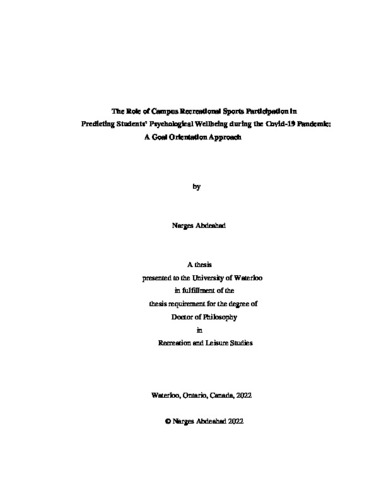| dc.description.abstract | The emergence of the Covid-19 pandemic and sudden campus lockdown added new stressors and challenges (e.g., academic uncertainty, e-learning challenges, financial/emotional struggles; Abdeahad & Mock, in review) to post-secondary students’ academic life. Drawing on goal orientation theory (Dykman, 1998), the purpose of this study was to examine the role of pre-lockdown campus recreational sports (CRS) participation in protecting students’ psychological wellbeing during the Covid-19 pandemic. Furthermore, growth mindset was examined as a potential mediator to explain how pre-lockdown CRS participation can help students use more adaptive coping strategies to overcome Covid-19 related challenges and protect their psychological wellbeing during the campus lockdown.
Studies show growth-oriented individuals see challenges and setbacks as opportunities to learn new strategies rather than as a test of their basic self-worth (i.e., goal orientation model; Dykman, 1998). In the face of negative life events, rather than losing self-esteem, starting self-blaming, or disengaging from an apparently unmanageable activity, a growth-oriented individual appraises negative outcomes less threatening. Therefore, they experience less anxiety and may have a greater level of psychological wellbeing. From leisure and recreational perspective, regular exercises and sport activities can also improve self-control, self-esteem, self-efficiency, and positive social interactions all of which help students cope more adaptively with life stressors (Edwards, 2002; Coleman & Iso-Ahola, 1993; Yiannakis et al, 2001) leading to greater personal and social growth (Shaw & Dawson, 2001) and psychological wellbeing enhancement (Kilgo et al., 2016; Stebbins, 2018). Pre-lockdown CRS participation was also associated with lower levels of stress during the pandemic (Abdeahad & Mock, in review). Taken together, it stands to reason that the students who participated in CRS activities before the pandemic are likely to be more growth oriented. Therefore, in the face of pandemic-related challenges they are more likely to engage in adaptive coping strategies which in turn can protect their psychological wellbeing over time.
Self-administered online survey data were collected at two time points from 116 students who participated in CRS programs at the University of Waterloo. Findings showed that the sample participants were mainly undergraduate male domestic Canadian students who, on average, participated four times a week in different recreational activities offered on campus before the lockdown.
Regression analyses were used to investigate the effect of CRS participation on five dimensions of psychological wellbeing: autonomy, environmental mastery, positive relations with others, self-acceptance, and purpose in life during the pandemic. Results indicated that pre-lockdown CRS participation had a significant positive impact on protecting students’ environmental mastery and self-acceptance during the pandemic. However, the association was not statistically significant with autonomy, positive relations with others, and purpose in life. The off-campus recreational activities (e.g., running, bicycling, yoga) in which students participated during the lockdown were not found to have a statistically significant effect on the associations, showing that positive outcomes of engagement in CRS activities is beyond short term enjoyment, physical benefits, learning new sports, or finding new friends.
An examination of the serial mediation model in which the pathway of CRS participation predicting psychological wellbeing (i.e., environmental mastery and self-acceptance) first through growth mindset and then subsequently through adaptive coping strategies showed that the indirect effect through both mediators was statistically significant. It can be concluded that pre-lockdown CRS participation can enhance students’ growth mindset, therefore, they are less likely than those with a validation mindset to consider challenges as a threat, but a warning that their life is out of balance, and a desire to find meaning or purpose in the challenges they encounter. According to Dykman (1998) an individual with a primarily growth mindset appraises stressors as manageable and controllable problems that need to be either resolved or the underlying negative emotions should be modified. Therefore, they engage more in adaptive coping strategies such as instrumental supports, new strategy plans, positive reframing, and emotional support. It can be concluded that greater pre-lockdown CRS participation helped students to enhance a growth mindset, and that in the face of pandemic-related challenges, due to this growth mindset, they could take on behaviours to manage problems and challenges in a way to protect their perception of mastery and self-acceptance. | en |

